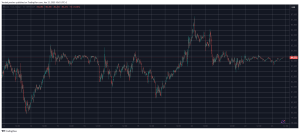Established in 2014, BitMEX is a veteran derivatives exchange, a pioneer for the crypto industry, which used to be the leading one for a serious period of time. In fact, the traded volume on BitMEX was much more than that on any other derivatives exchange until 2019.
BitMEX exchange had a serious impact on the cryptocurrency market as a whole, and in a sense, helped shape the industry into what it has become today.
CryptoPotato had the pleasure of interviewing Alexander Hoeptner – the CEO of BitMEX. In this episode, we talk about the ever-increasing regulatory presence in the industry, whether it’s good or bad for it, where the market is going to, how’s BitMEX doing after the $100 million CFTC and FinCen settlement, and many more interesting things.
Crypto Similar to Traditional Finance, But Faster
First things first, it’s important to note that Hoeptner comes with a rich background in traditional finance. Boerse Stuttgart, Euwax AG, Deutsche Borse, and so forth are just some of the conventional institutions he had a high-ranked and even executive position at for years before joining BitMEX.
With this in mind, we felt that he’s the perfect person to ask about the overlap between crypto and traditional finance, whether it exists, and to what extent.
“Even if the more crypto-native folks might not like to hear it, crypto is actually, in many senses, like the traditional financial world 25-30 years ago, coming from an unregulated, unstructured world, going to a regulated one and seeing the same impacts that we’ve seen in the traditional financial world 25-30 years ago.”
However, Hoeptner also outlined that the developments that are going on in the crypto field, compared to that in the traditional financial world, are happening at a “much faster pace.”
“What we’ve seen happen in the traditional financial world in the past 30 years happened in 2 years [in the crypto industry].”
Stepping into Arthur Hayes and Ben Delo’s Shoes
A little less than a year ago, the United States Commodity and Futures Trading Commission (CFTC) charged the BitMEX owners with illegally operating a cryptocurrency exchange – a move that came as a shock to the entire community. At the time, spearheading the company was Arthur Hayes – one of the most iconic figures in the field.
It’s worth noting that the corporate structure behind BitMEX is called 100x Group. Not long after the charges, Arthur Hayes stepped down as the CEO, while Samuel Reed, the CTO, did the same.
We asked Hoeptner how it was stepping into the shoes of the previous founding team, including co-founders Arthur Hayes and Ben Delo:
“It is heritage because these are really iconic characters and I’m not them. I’m Alex, I’m not Ben [Delo], I’m not the inventor of the perp. […] I will bring Bitmex to the next level.”
Sharing more details about the current focus of 100x, as well as its structure, he said:
“Firstly, 100x is the holding company behind BitMEX, which is the operation brand. […] The plan is to move into spot, brokerage, custody, information products and surround this with an educational arm because I think and we believe that there is still a lot of educational work to be done to go toward full mass-market adoption.”
He clarified that all of this will be done under the BitMEX brand. The CEO also outlined that the focus on KYC and AML will help them transition to other products, more precisely – spot and custody.
It’s also worth noting that back in January 2021, BitMEX reported that 100% of their trading volume and the user base is entirely verified.
‘We Need to Develop the New Regulation’
The past few months saw a massive focus on regulatory efforts in the cryptocurrency field on behalf of legislative bodies throughout the world.
Hoeptner thinks that it’s “most likely” that regulators will first put crypto into the same buckets as traditional assets. This, naturally, is wrong, according to him, because of the capabilities and possibilities of the tokenized world and crypto in general. However, Hoeptner said that it’s the industry’s obligation to educate together with the regulators of the mass market and tailor the rules to fit the specifics of the field.
“This comes to us. We cannot expect the regulators to be more advanced than us on that space. We need to get to them and discuss and in a process develop the new regulation.”
Throughout the podcast, we also discussed BitMEX’s policy on adding new coins – how do they vet the projects and the specifications around it. Hoeptner also shared his plans, saying that his goal is to bring BitMEX to the next level.
To find out more about what can we expect from one of the most iconic exchanges in our field, tune in and listen to the above podcast.






















